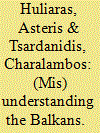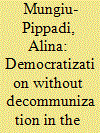| Srl | Item |
| 1 |
ID:
074552


|
|
|
|
|
| Publication |
2006.
|
| Summary/Abstract |
For most Greeks, neighbouring countries like Yugoslavia, Bulgaria, Romania and Albania formed a terra incognita for almost half a century since the end of the Second World War. In the early 1990s communism collapsed in all four countries and despite the three bloody wars that followed the break-up of Yugoslavia, information, goods and people crossed Balkan boundaries in unprecedented speed. The paper examines three geopolitical codes about the Balkans that successively dominated Greek views and policies in the last fifteen years: the idea of a menacing 'muslim arc', the image of the Balkans as a Greek 'natural hinterland' and the idea of the Balkans as an undisputed part of Europe. All these geopolitical ideas were introduced by the Greek political elite and influenced decisively both Greek foreign policy and public attitudes for about half a decade each.
|
|
|
|
|
|
|
|
|
|
|
|
|
|
|
|
| 2 |
ID:
073659


|
|
|
|
|
| Publication |
2006.
|
| Summary/Abstract |
Since recent U.S.-led democratization projects having led in some cases to the election of Islamist movements, the old democratic theory that structural preconditions are key determinants of successful democratization has apparently been bolstered. This article examines the democratization experience in postcommunist Europe to assess which matters more, a society's "givens" favoring democracy or the institutional imports that a democracy-minded elite can borrow. In particular, it compares the experience of the Southeast Europe countries, which presented poor prerequisites for successful democratization and yet in at least two cases (Romania and Bulgaria) are far along on the path to democratization to the experience of Central Europe and the former Soviet Union as a whole.
|
|
|
|
|
|
|
|
|
|
|
|
|
|
|
|